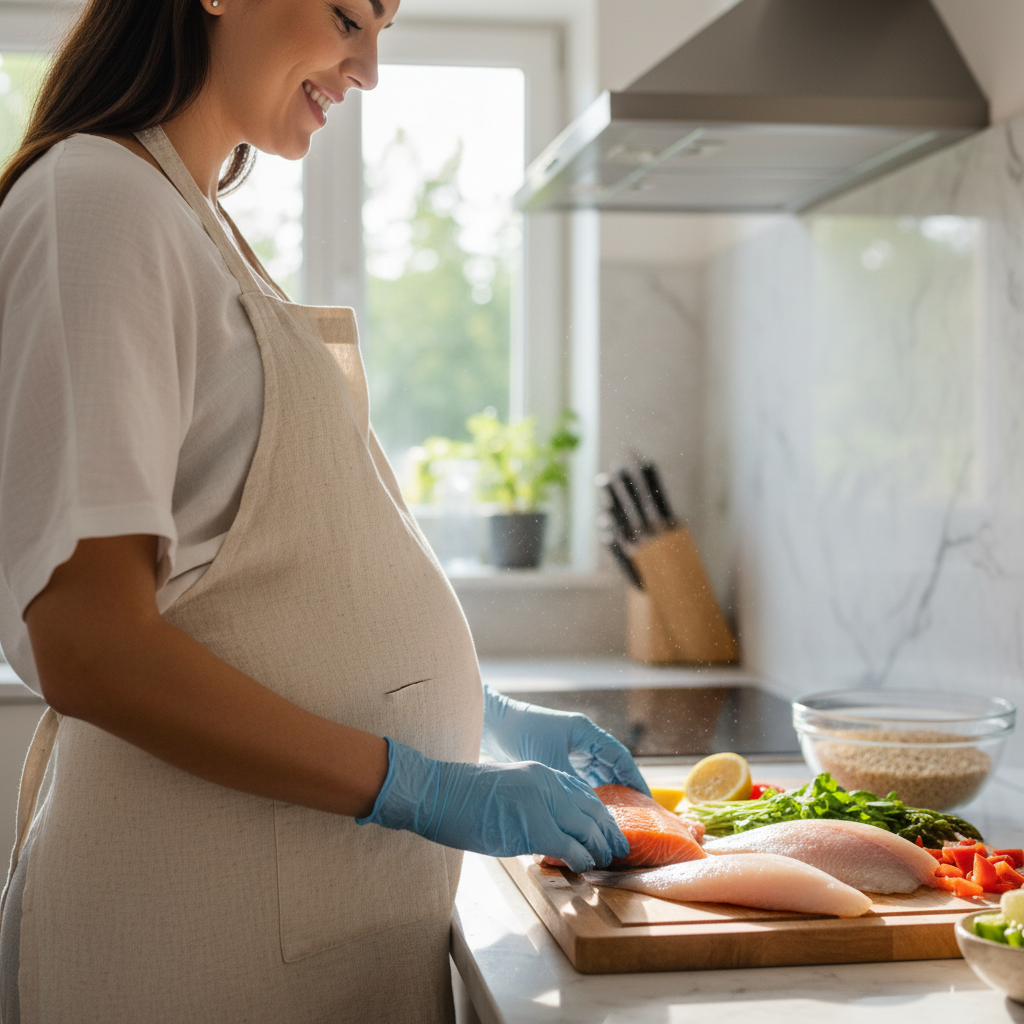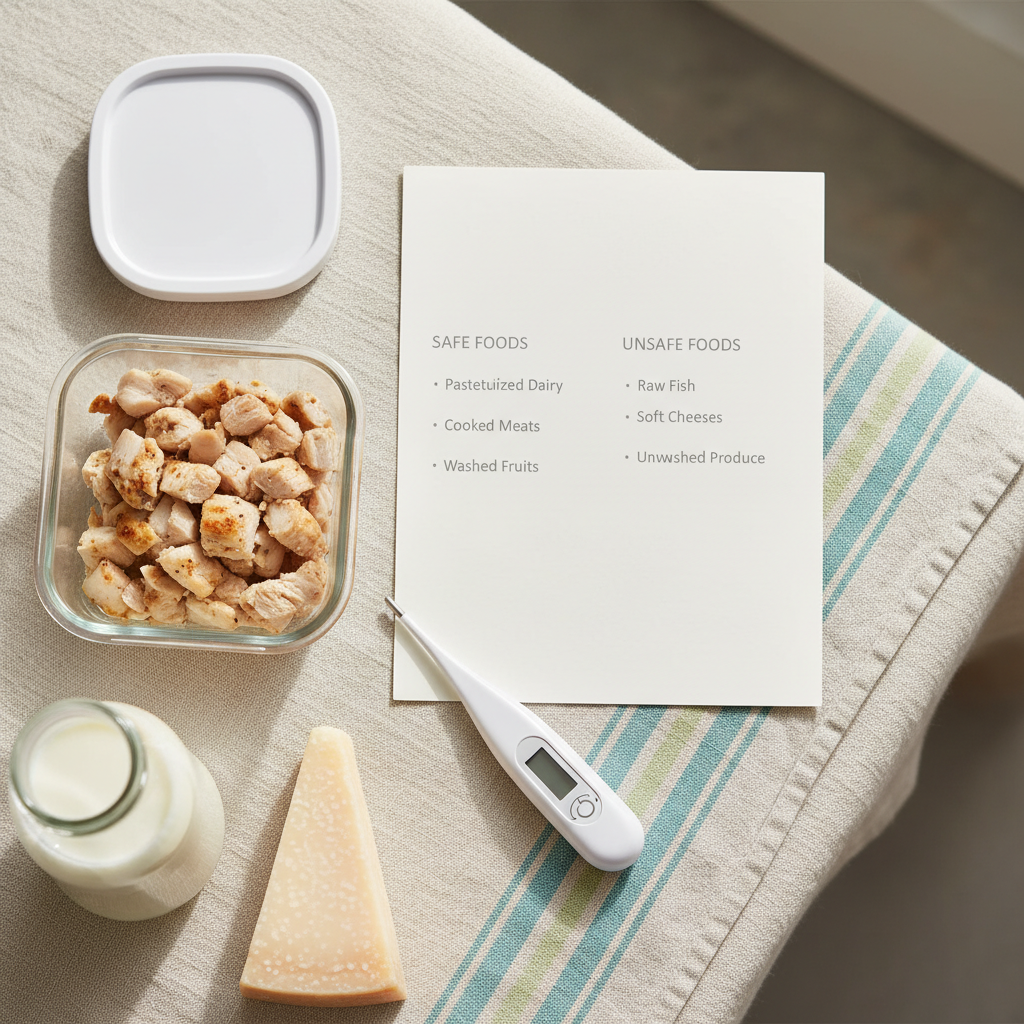
What Foods to Avoid During the Second Trimester
During the second trimester, your baby’s development accelerates rapidly, making food safety more crucial than ever. Your dietary choices directly impact your baby’s growth and your health, requiring extra attention to potentially harmful foods that were once part of your regular diet.
Key Highlights
Here are the most important foods to avoid during this critical stage of pregnancy:
- High-mercury fish like king mackerel, swordfish, and bigeye tuna pose developmental risks to your baby
- Raw or undercooked foods including meat, eggs, and seafood can harbor harmful bacteria
- Unpasteurized dairy products and soft cheeses may contain listeria bacteria
- Deli meats and ready-to-eat foods require heating to safe temperatures before consumption
- Limit caffeine intake to 200mg daily (about one 12oz cup of coffee)
Understanding Changes: Second Trimester Nutritional Needs

The second trimester brings welcome relief from early pregnancy symptoms for many women, but it also introduces new nutritional considerations. Your baby is now growing rapidly, developing vital organs and systems that are particularly vulnerable to certain food-borne pathogens and toxins. During this period, your immune system remains naturally suppressed to prevent your body from rejecting the pregnancy, making you more susceptible to food-borne illnesses that might cause only mild symptoms in non-pregnant individuals.
According to the American College of Obstetricians and Gynecologists, this period between weeks 13-27 requires about 340 additional calories daily compared to your pre-pregnancy diet. However, the quality of these calories matters significantly. While your appetite may increase, focusing on nutrient-dense foods while avoiding potential risks becomes essential for supporting your baby’s brain development, bone growth, and overall health.
Understanding Changes: High-Mercury Fish Concerns
Seafood offers valuable omega-3 fatty acids and protein, but certain fish contain high mercury levels that can harm your baby’s developing nervous system. The FDA and EPA specifically advise pregnant women to avoid king mackerel, marlin, orange roughy, shark, swordfish, tilefish, and bigeye tuna due to their mercury content. These larger, predatory fish accumulate more mercury throughout their lives, making them particularly risky during pregnancy.
Instead, choose lower-mercury alternatives like salmon, shrimp, pollock, catfish, and canned light tuna (limiting albacore tuna to 4 ounces weekly). The American Pregnancy Association recommends consuming 8-12 ounces (2-3 servings) of low-mercury seafood weekly to obtain beneficial DHA and EPA omega-3 fatty acids that support your baby’s brain development. This balanced approach allows you to gain the nutritional benefits of seafood while avoiding potential neurodevelopmental risks associated with mercury exposure.
Your Body & Baby: Raw Food Risks

Raw or undercooked foods pose significant risks during pregnancy due to potentially harmful bacteria that can cross the placental barrier. The CDC warns that raw meats, poultry, seafood, and eggs may contain pathogens like Salmonella, E. coli, and Toxoplasma that can lead to severe infections, potentially causing pregnancy headaches second trimester and more serious complications. These infections may trigger food poisoning symptoms that are not only uncomfortable but can sometimes lead to preterm labor or miscarriage.
Raw sprouts (including alfalfa, clover, radish, and mung bean) grow in warm, humid conditions that are ideal for bacterial growth and should be avoided entirely unless thoroughly cooked. Similarly, uncooked cookie dough or cake batter containing raw eggs presents a risk of salmonella exposure. Cook all meats to proper internal temperatures (145°F for whole cuts of beef and pork, 160°F for ground meats, and 165°F for poultry), and ensure eggs are cooked until both whites and yolks are firm to eliminate these risks.
Your Body & Baby: Cheese and Dairy Considerations
Unpasteurized dairy products can harbor Listeria monocytogenes, a bacteria particularly dangerous during pregnancy as it can cross the placental barrier and cause serious complications. Soft cheeses made with unpasteurized milk—such as feta, brie, camembert, blue-veined varieties, queso fresco, and queso blanco—are common sources of listeria and should be avoided during the 2nd trimester unless the label specifically states “made with pasteurized milk.”
Hard cheeses like cheddar, swiss, and parmesan typically pose lower risks even when unpasteurized, as their aging process tends to reduce bacterial contamination. For dairy lovers, yogurt and pasteurized milk provide essential calcium and vitamin D without the associated risks of unpasteurized products. When dining out, don’t hesitate to ask about cheese ingredients in prepared foods, as many restaurants use unpasteurized varieties in their dishes. Remember that pasteurization doesn’t reduce nutritional benefits—it simply eliminates potentially harmful bacteria while preserving the important nutrients your growing baby needs.
Healthy Living Tips: Navigating the Deli Counter

Deli meats and ready-to-eat foods require special attention during the 2nd month pregnancy and beyond. Prepackaged lunch meats, hot dogs, pâtés, meat spreads, and refrigerated smoked seafood can harbor listeria bacteria that continue to grow even at refrigeration temperatures. The CDC recommends heating these products until steaming hot (165°F) before consumption to kill potential bacteria. Store-made salads containing eggs, chicken, ham, and seafood also present similar risks when consumed cold.
You can safely enjoy these foods with simple precautions. Use a food thermometer to verify proper heating temperatures, and when ordering at restaurants, request that sandwiches containing deli meats be heated thoroughly. Canned or shelf-stable pâtés and meat spreads are generally safe alternatives to refrigerated versions. For convenience, consider cooking and slicing your own meats at home as a safer alternative to pre-packaged options, and always practice prompt refrigeration of leftovers to minimize bacterial growth.
Healthy Living Tips: Beverages and Hidden Concerns
Beverages deserve careful consideration during pregnancy, with alcohol remaining completely off-limits throughout all trimesters. The Centers for Disease Control emphasizes that no amount of alcohol has been proven safe during pregnancy, as it can lead to fetal alcohol spectrum disorders affecting your baby’s development. Caffeine requires moderation, with most health authorities recommending limiting intake to 200mg daily (approximately one 12-ounce cup of coffee or two 8-ounce cups of tea).
Beyond the well-known restrictions, be cautious with herbal teas, as not all are pregnancy-safe. Stick to commercial pregnancy teas or commonly recognized safe options like ginger, peppermint, and red raspberry leaf (particularly beneficial during the third trimester). Energy drinks should be avoided entirely as they often contain high caffeine levels and additional stimulants like guarana that haven’t been well-studied during pregnancy. Unpasteurized juices pose similar risks to unpasteurized dairy and should be avoided unless the packaging specifically indicates pasteurization. Focus on water as your primary beverage, aiming for 8-10 cups daily to support your increased blood volume and amniotic fluid needs.
Final Thoughts on Second Trimester Food Safety
Making informed food choices during your second trimester supports both your health and your baby’s optimal development. By understanding which foods to avoid and implementing simple safety practices, you can significantly reduce potential risks while still enjoying a varied, nutritious diet. Remember that these dietary adjustments are temporary but play a crucial role in protecting your growing baby during this vital developmental stage.
Sources
American College of Obstetricians and Gynecologists (ACOG) – Nutrition During Pregnancy
FDA – Advice About Eating Fish for Women Who Are or Might Become Pregnant
American Pregnancy Association – Foods to Avoid During Pregnancy
Centers for Disease Control and Prevention (CDC) – Food Safety for Pregnant Women
Mayo Clinic – Pregnancy Nutrition: Foods to Avoid During Pregnancy
